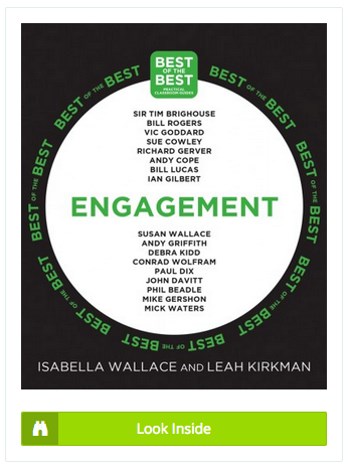Engagement from Crown House Publishing


The best advice I ever received on how to improve teaching, and therefore schools, came from the American educator Judith Little, whose research concluded that you knew you were in a good school when the following four characteristics were present:
- Teachers talk about teaching.
- Teachers observe each other teach.
- Teachers plan, organise and evaluate together.
- Teachers teach each other.
My reason for liking these findings is because you can easily see how you can increase or decrease the likelihood of these four things happening. For example, if the agendas of meetings are packed with administrative imperatives rather than discussion of pedagogy or curricular subtleties to aid learning, then meetings are wasted time. Conversely, starting primary staff meetings in different classrooms, with the host analysing where they are with optimising the environment for learning, will promote valuable debate – as would an agenda item where, in turns (one member per meeting), staff outline the book they are reading with their class and why it works for that age group.
Or, at secondary level, the senior leadership team (SLT) taking over the teaching of a department for a day could enable the staff to be released to visit a department in another school.
My advice, therefore, would be to have a session where all staff look at the four characteristics outlined by Judith Little and share ideas of how, with minimal effort, school practices could be adjusted to make them happen more often.
Contributors include: Sir Tim Brighouse, Dr Bill Rogers, Vic Goddard, Sue Cowley, Richard Gerver, Andy Cope, Professor Bill Lucas, Ian Gilbert, Professor Susan Wallace, Andy Griffith, Dr Debra Kidd, Conrad Wolfram, Paul Dix, John Davitt, Phil Beadle, Mike Gershon and Professor Mick Waters.
Isabella Wallace is co-author of the bestselling teaching guides Pimp Your Lesson! and Talk-Less Teaching, and has worked for many years as an AST, curriculum coordinator and governor. She is a consultant for and contributor to the Oxford Dictionary of Education and presents nationally and internationally on outstanding learning and teaching.
Leah Kirkman is co-author of the bestselling teaching guides Pimp Your Lesson! and Talk-Less Teaching, and is an experienced AST and trainer. Keeping the needs of both the busy teacher and the discerning learner at the heart of all her training, Leah works with teachers both across the UK and abroad developing outstanding teaching and learning.
The best advice I ever received on how to improve teaching, and therefore schools, came from the American educator Judith Little, whose research concluded that you knew you were in a good school when the following four characteristics were present:
- Teachers talk about teaching.
- Teachers observe each other teach.
- Teachers plan, organise and evaluate together.
- Teachers teach each other.
My reason for liking these findings is because you can easily see how you can increase or decrease the likelihood of these four things happening. For example, if the agendas of meetings are packed with administrative imperatives rather than discussion of pedagogy or curricular subtleties to aid learning, then meetings are wasted time. Conversely, starting primary staff meetings in different classrooms, with the host analysing where they are with optimising the environment for learning, will promote valuable debate – as would an agenda item where, in turns (one member per meeting), staff outline the book they are reading with their class and why it works for that age group.
Or, at secondary level, the senior leadership team (SLT) taking over the teaching of a department for a day could enable the staff to be released to visit a department in another school.
My advice, therefore, would be to have a session where all staff look at the four characteristics outlined by Judith Little and share ideas of how, with minimal effort, school practices could be adjusted to make them happen more often.
Contributors include: Sir Tim Brighouse, Dr Bill Rogers, Vic Goddard, Sue Cowley, Richard Gerver, Andy Cope, Professor Bill Lucas, Ian Gilbert, Professor Susan Wallace, Andy Griffith, Dr Debra Kidd, Conrad Wolfram, Paul Dix, John Davitt, Phil Beadle, Mike Gershon and Professor Mick Waters.
Articles and interviews available.
Isabella and Leah are available for interview, expert comment or by-lined articles on a range of topics, such as:
- Getting Engaged! What stimulates curiosity and passion in learners?
- Engage! Capturing students’ attention Star Trek style
- Not Another ‘Twilight’! The highs and lows of CPD (An article about engaging teachers in their own development)
- Treating Teachers Better: Essential principles for restoring teacher autonomy and enhancing staff engagement
- ‘Can’t Be Bothered!’ Eight practical ways to engage the reluctant learner
- Combatting Chaos in the Classroom: Eight practical ways to get a class focused and engaged from the outset
- Engagement versus Entertainment (An article about the important distinction between inspiring intrigue and engagement in a topic or skill, and simply sugarcoating the work with a meaningless, superficial ‘fun’ activity)

Isabella Wallace is co-author of the bestselling teaching guides Pimp Your Lesson! and Talk-Less Teaching, and has worked for many years as an AST, curriculum coordinator and governor. She is a consultant for and contributor to the Oxford Dictionary of Education and presents nationally and internationally on outstanding learning and teaching.
Leah Kirkman is co-author of the bestselling teaching guides Pimp Your Lesson! and Talk-Less Teaching, and is an experienced AST and trainer. Keeping the needs of both the busy teacher and the discerning learner at the heart of all her training, Leah works with teachers both across the UK and abroad developing outstanding teaching and learning.



|